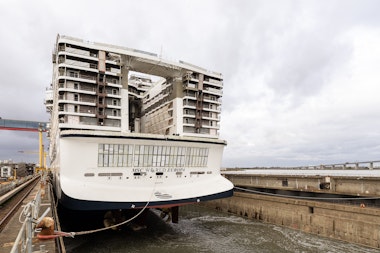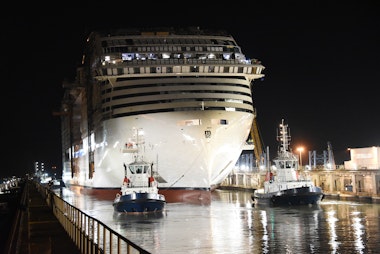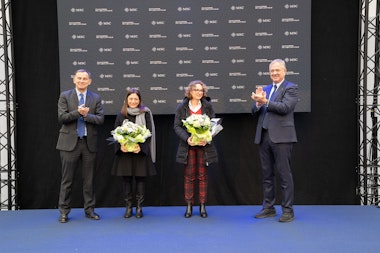Country or Region selection
Worldwide MSC International
Europe
MSC CRUISES AND CHANTIERS DE L’ATLANTIQUE CELEBRATE TWO SIGNIFICANT NEWBUILD MILESTONES FOR LINE’S NEXT GENERATION OF ENVIRONMENTALLY ADVANCED CRUISE SHIPS
07/12/2021- Float out of MSC’s first LNG powered vessel, MSC World Europa, which will operate with significantly reduced emissions
- And the coin ceremony for also LNG-powered MSC Euribia, one the most environmentally high performing contemporary vessels ever built in France
- MSC Cruises and the Chantiers de l’Atlantique confirmed the installation of a fuel cell pilot plant on board MSC World Europa
Saint-Nazaire, France, 2 December 202I – The Cruise Division of MSC Group and Chantiers de l’Atlantique today celebrated two significant newbuild milestones for the construction of the line’s next generation of environmentally advanced vessels. MSC World Europa and MSC Euribia will become the first LNG-powered vessels to join the MSC Cruises fleet next year representing an investment of €3 billion in Liquified Natutal Gas (LNG) ships with the construction on World Europa II due to commence in early 2023.
These ships play an important role in the Company’s commitment to achieving net zero greenhouse gas emissions by 2050. LNG is by far the cleanest marine fuel currently available at scale and it virtually eliminates local air pollutant emissions like sulphur oxides (99%), nitrogen oxides (85%) and particles (98%). In terms of emissions with a global impact, LNG plays a key role in climate change mitigation and the engines of these two ships have the potential to reduce CO2 emissions by up to 25% compared to standard fuels. In addition, with the subsequent availability of Bio and Synthetic forms of LNG, this energy source will provide a pathway toward eventual decarbonized operations.
Pierfrancesco Vago, Executive Chairman, MSC Cruises, said: “Today is another important milestone in our journey towards net zero emissions by 2050 for our marine operations. Following billions of euros of investment, we are announcing significant construction developments in not just one but two of our next generation LNG-powered vessels bringing us ever closer to our vision of an emissions free cruise industry. As the cleanest fuel currently available at scale for our operations, LNG is at the vanguard of the momentous energy transition we must go through.”
“We have a lot more to do but I am pleased that despite all that we have faced from the pandemic over the last two years, we have still been able to achieve with our partners at Chantiers de L’Atlantique the launch of these new LNG vessels – the first ever made in France that will also introduce potential new fuel cell technologies to make them even more efficient. We now need to take even bigger steps and we will need the continued support of our suppliers, partners and Governments to achieve this. We all need to work together to achieve our green future.”
Laurent Castaing, General Manager, Chantiers de l’Atlantique, added: “It is indeed a very special moment we are living today. This is not only because these ships are respectively the 15 th and the 16 we are building for MSC Cruises- which shows the outstanding quality of the relationship we established between our two companies since the 90’s. This is not only because they will rank among the largest and the finest of the world’s cruise market. But it is also and especially because they represent a giant step towards what the cruise ships of the future will look like. At their delivery, they will have the best carbon footprint of the market, in terms of emissions per passenger and per day”
It was also revealed today that MSC Cruises and the Chantiers de l’Atlantique confirmed the installation of a fuel cell pilot plant on board MSC World Europa known as Blue Horizon. The technology will use LNG to convert fuel into electricity at one of the highest efficiencies of any power solution available today, producing electricity and heat on board. The fuel cell technology selected by Chantiers de l'Atlantique (CdA) and MSC Cruises is the SOFC (Solid Oxide Fuel Cell) developed by Bloom Energy. The SOFC will reduce emissions of greenhouse gases (GHG) by about a further 30 percent compared with a conventional LNG engine without producing emissions of nitrogen oxides, sulphur oxides or fine particles. It also offers the advantage of being compatible with LNG, as well as several low carbon fuels such as types of methanol, ammonia and hydrogen. This project will form the building block for future larger installations and the beginning of an even closer collaboration between MSC Cruises and Chantier de L’Atlantique on R&D of fuel cell technology.
The traditional coin ceremony tradition took place as the keel was laid for MSC Cruises’ second LNG-powered ship, MSC Euribia, which will be one of the most environmentally high performing contemporary vessels built in France. Anne Claire Juventin Responsible for Quality Control from the Chantiers de l’Atlantique, and Valentina Mancini, Brand Manager from MSC Cruises performed the traditional maritime ritual as godmothers representing the ship owner and the shipbuilder when they placed two coins under the keel as the historical sign of blessing and good fortune for the project, and the ship’s operational life at sea.
The float out of MSC World Europa, which will be the first LNG-powered vessel to join the MSC Cruises fleet took place at the shipyard in Saint-Nazaire where she will now be moved to a wet dock for work to continue on the ship until her delivery in November 2022.
MSC World Europa – next-generation cruise experience
MSC World Europa is the first in the trailblazing MSC World Class - a brand new class of ships that introduces a completely new cruising platform. Boasting future-proof marine and onboard hospitality technologies, MSC World Europa will redefine the cruise experience with a variety of never-before-seen concepts and creative areas unlike anything at sea today. The ground-breaking design features a Y-shaped aft that leads to the impressive 104-metre long half open half covered Europa Promenade with breathtaking ocean views. Brand new balcony cabins overlook the breathtaking promenade, which features a striking architectural centrepiece in the form of The Venom Drop @ The Spiral, an 11-deck-high slide, the longest at sea.
The guest experience is taken to a whole new level with a veritable world of different experiences with distinct districts, each boasting their own mood and experiences, from a tranquil zen district to the lively promenade with entertainment, shops and bars, to a separate and family district with ten new kids’ facilities. Featuring 21 bars and lounges and 13 next-level dining venues, the dining on board offers a whole host of new innovations. This includes the Chef’s Garden Kitchen focussing on flavourful microgreens and La Pescaderia, a traditional seafood grill with alfresco seating. Fan favourites such as Butcher’s Cut, Kaito Teppanyaki Grill and Sushi Bar and Hola! Tacos & Cantina will also return.
MSC World Europa will welcome her first guests from December 2022 and will spend her inaugural season in the Gulf region giving guests the ultimate winter cruise experience. Guests will be able to enjoy 7-night cruises from Dubai to the nearby modern metropolis of Abu Dhabi, on to Sir Bani Yas Island, Dammam in Saudi Arabia, visiting Al Ahsa oasis, a UNESCO World Heritage site and Doha, the futuristic capital of Qatar, before returning to Dubai with an overnight in the city to discover all the marvels it has to offer.
Departing Dubai on 25 March 2023, MSC World Europa will head to the Mediterranean Sea. In summer 2023, she will offer 7-night cruises calling the Italian ports of Genoa, Naples and Messina, as well as Valletta in Malta, Barcelona in Spain and Marseille in France.
MSC Euribia – a symbol of MSC Cruises respect for the oceans
MSC Euribia will become one of the most environmentally advanced ship in MSC Cruises’ fleet to date and is named after the ancient goddess Eurybia who harnessed the winds, weather and constellations to master the seas. In order to demonstrate the Company’s commitment to building environmentally advanced ships and to show the importance of respect for the environment, MSC Cruises has launched a global design contest for artists from around the world to create a unique artwork inspired by the sea and its important marine ecosystem. The winning design will transform the hull of MSC Euribia into a giant, floating canvas to communicating the importance that will be featured as a permanent design across the ship’s hull, as she sails the world’s oceans.
Engines and fuels: 4 Wärtsilä (12V and 16V) dual fuel engines generally running on liquefied natural gas (LNG), occasionally on 0.1% sulphur marine gasoil (MGO) so the ship will not require exhaust gas cleaning systems
Air Emissions: Selective catalytic reduction system that reduces NOx emissions by up to 90% when the ship runs on MGO (LNG offers a similar NOx reduction) – MSC Euribia will meet the IMO’s Tier III standards regardless of the fuel it uses
Shore-to-ship power connectivity, allowing the ship to switch off its engines and connect to local power grids at ports where this infrastructure is available
Wastewater: Advanced wastewater treatment system complying with the International Maritime Organization’s MEPC 227(64) Resolution at the world’s most stringent standards – the so-called ‘Baltic Standard’
Advanced ballast water treatment system will prevent the introduction of invasive species in the marine environment through ballast water discharges, complying with the International Maritime Organization’s Ballast Water Management Convention
Protecting Marine Life: Underwater radiated noise management system, with hull and engine room designs that minimise acoustic sound impact, reducing their potential effects on marine fauna, most particularly on marine mammals in the surrounding waters.
Energy Efficiency: All MSC Cruises’ newbuilds incorporate a wide range of energy efficient equipment that help reduce and optimise on board energy use. These include various technologies such as smart ventilation and advanced air conditioning systems with automated energy recovery loops that redistribute heat and cold to reduce demand. The ships use LED lighting controlled by smart management systems to enhance further the energy saving profile. In partnership with the shipyard, MSC Euribia will be fitted with automatic data collection systems for remote energy monitoring and advanced analysis, allowing real-time shoreside support to optimise operational efficiency onboard.


